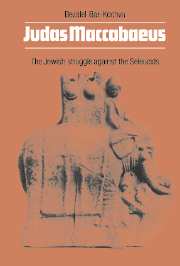Book contents
- Frontmatter
- Contents
- List of illustrations
- Transliteration of Hebrew
- Acknowledgements
- Prologue
- PART I HISTORICAL EVALUATION
- PART II ACCOUNTS OF THE BATTLES: INTRODUCTION, TEXT AND COMMENTARY
- 8 The sources: their date, provenance and characteristics
- 9 The beginning of the Revolt and the battle against Apollonius
- 10 The ambush for Seron at the Beth Horon Ascent
- 11 The ceremony at Mizpah and the Ammaus campaign
- 12 Lysias' first expedition and the raid near Beth Zur
- 13 Lysias' second expedition and the battle at Beth Zacharia
- 14 The negotiations with Nicanor and the encounter at Kafar Salama
- 15 The battle of Adasa and Nicanor Day
- 16 Bacchides' second expedition and the battle of Elasa
- Conclusion
- PART III APPENDICES
- EXCURSUS
- Plates
- Abbreviations
- References
- Indexe locorum
- General index
- Index of Greek terms
- Index of Hebrew words and phrases
14 - The negotiations with Nicanor and the encounter at Kafar Salama
Published online by Cambridge University Press: 04 August 2010
- Frontmatter
- Contents
- List of illustrations
- Transliteration of Hebrew
- Acknowledgements
- Prologue
- PART I HISTORICAL EVALUATION
- PART II ACCOUNTS OF THE BATTLES: INTRODUCTION, TEXT AND COMMENTARY
- 8 The sources: their date, provenance and characteristics
- 9 The beginning of the Revolt and the battle against Apollonius
- 10 The ambush for Seron at the Beth Horon Ascent
- 11 The ceremony at Mizpah and the Ammaus campaign
- 12 Lysias' first expedition and the raid near Beth Zur
- 13 Lysias' second expedition and the battle at Beth Zacharia
- 14 The negotiations with Nicanor and the encounter at Kafar Salama
- 15 The battle of Adasa and Nicanor Day
- 16 Bacchides' second expedition and the battle of Elasa
- Conclusion
- PART III APPENDICES
- EXCURSUS
- Plates
- Abbreviations
- References
- Indexe locorum
- General index
- Index of Greek terms
- Index of Hebrew words and phrases
Summary
In the autumn of 162 B.G. there was a court insurrection at Antioch. Demetrius I (son of Seleucus IV and nephew of Antiochus Epiphanes), who was then twenty-three, attained the throne. He had been a hostage at Rome since childhood, in compliance with the terms of the Treaty of Apamea. Learning of the succession crisis in the kingdom that had developed in the wake of Antiochus Epiphanes’ death, he had requested the Senate's permission to return to Syria and take over. When none was forthcoming he departed secretly with the active help of Polybius, the great Greek historian. In Syria he apparently gained the support and assistance of the Greco-Macedonian military settlers, the backbone of the Seleucid army and government. Because of their delicate situation within the native population, they were interested in putting the reins of leadership into stable, strong hands that would loyally represent the legitimate dynasty. Antiochus V Eupator was too young, and Lysias, who indeed aspired to the throne, was not a member of the royal family and could therefore not expect much support.
The accession of Demetrius met with the hostility of the Roman Senate, which did not forgive the new king for having fled from Rome. Suspicious, too, of his aggressive and dynamic personality, the Senate refused to recognize his authority and maintained cor tacts of various sorts with rebellious elements in the Seleucid empire. In contrast to the admiration that he was accorded in Syria, Demetrius was unable to win over the countries east of the Euphrates.
- Type
- Chapter
- Information
- Judas MaccabaeusThe Jewish Struggle Against the Seleucids, pp. 347 - 358Publisher: Cambridge University PressPrint publication year: 1989



